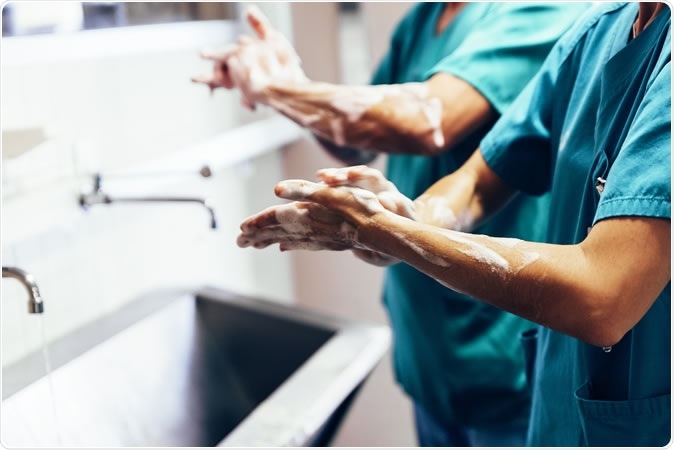The World Health Organization (WHO) recommends a 30 second application of a six-step hand washing and hand rub regimen that could keep infections away. New research titled, 'Simplifying the WHO protocol for hand hygiene, three steps and 15 seconds: a randomized crossover trial' and presented at the European Congress of Clinical Microbiology & Infectious Diseases (ECCMID) in Amsterdam, Netherlands held between 13th and 16th of April suggests hand rubs could achieve the same in a three step procedure for 15 seconds.

Image Credit: Santypan / Shutterstock
Alcohol based hand rubs are widely used in hospitals and other set ups for infection control. This hand hygiene could be a crucial measure to prevent and reduce the spread of infections. There are no studies evaluating the best practice that could reduce infections. The WHO recommended six-step hand rub technique is effective in killing bacteria. This study shows that a simple 15 second three step hand rub could be just as effective in killing bacteria as well as improved user adherence.
Dr Sarah Tschudin-Sutter and colleagues from University Hospital Basel, Switzerland, tried their 15 second three step hand rub regimen in a randomised cross-over trial. They recruited 20 healthy participants between ages 18 and 51 years. They were randomly assigned to four different techniques of hand rubs including;
- Six-step hand hygiene for 30 seconds
- Six-step hand hygiene for 15 seconds
- Three-step hand hygiene for 30 seconds and
- Three-step hand hygiene for 15 seconds
All participants were in turn assigned to each of the groups.
Results revealed that three step technique for 15 seconds was as effective as reducing bacteria counts on the hands of the volunteers as 30 second three or six step regimen.
Professor Tschudin-Sutter in a statement said, “The time pressure and heavy workload experienced by healthcare workers reduces compliance with hand hygiene standards. Our findings suggest that shortening hand rubbing time and simplifying the technique for use of hand rub could be a safe alternative that is easier to fit into their busy routine, could enhance the overall quality of hand hygiene performance, and have a positive effect on adherence. Further studies are needed to validate the performance of the shorter application time in everyday clinical practice.”
The team agrees that the study could not make blanket statements about the three step regimen’s ability to stop transmission of microbes unless studied in actual clinical settings.
Hand hygiene and reduction in Staph infections
In 2009 the National Australian Hand Hygiene Initiative (NHHI) was implemented and since then there has been a significant improvement in reduction of Staph infections in healthcare facilities. The results of this new study titled, 'Improved hand hygiene compliance (HHC) is associated with a significant reduction in rates of healthcare-associated Staphylococcus aureus bacteraemia (HA Sab) in Australia's 132 largest hospitals: outcomes of the Australian National Hand Hygiene Initiative (NHHI)', were presented at the European Congress of Clinical Microbiology & Infectious Diseases (ECCMID) in Amsterdam, Netherlands held between 13th and 16th of April.
The report suggests that there have been a significant improvement in hand hygiene and its adherence among Australian health care workers. This has reduced the risk of transmission of often fatal healthcare-associated Staphylococcus aureus infection. The researchers noted that for each 10 percent rise in adherence to hand hygiene guidelines, there was a 15 percent reduction in the incidence of S. aureus bloodstream infection among the 132 largest public hospitals of Australia as was seen from the study. These hospitals cater to over 15 million patients-days across the nation in 2016-17, they add. This translates to more than three quarters of inpatient care for the Australian population.
The team was following up the WHO campaign called “5 Moments for Hand Hygiene” that would reduce the risk of healthcare associated infections.
These five moments include;
- Before touching a patient
- After touching a patient
- After touching a patent's surroundings
- Before a clean procedure
- After exposure to body fluids/wounds
Professor Lindsay Grayson from Hand Hygiene Australia, and study leader said, “Hospital-acquired infections are a major concern for hospitals around the world and S. aureus is among the most dangerous. The risks to patients are enormous, as are the associated hospital costs. Despite robust evidence supporting improved practices for hand hygiene, securing compliance is notoriously difficult, and few national programmes have been sustained in the long-term.” The researchers and experts say that S. aureus is the main Gram positive bacterium that leads to hospital-acquired infections. Some of these such as endocarditis, acute pneumonia, and sepsis might become fatal and good hand hygiene could keep them at bay.
The team for this study looked at outcomes of the NHHI for eight years since it started. The timeline for the study was from January 2009 to June 2017. Three times a year hand hygiene moments were observed and recorded. The impact of this programme was assessed using linking of the data on hospital based S. aureus infections.
Results showed that hand hygiene compliance moments (observed) was 64 percent (36,213 of 56,978 potential opportunities of hand washing or hygeine) in 2009. The numbers came to 84 percent (494,673 of 586,559 potential opportunities of hand washing or hygiene) in 2017. The team looked at adherence to the hand hygiene moments among doctors, nurses and allied staff. They found that compliance to hand hygiene was 10 to 15 percent lower among medical staff compared to nursing staff over the 8 years of the study. Further every 10 percent increase in hand hygiene compliance reduced the S. aureus infection by 15 percent they found. Cases of S. aureus infection declined from 1.27 new cases per 10,000 bed-days in 2010-11 to 0.87 per 10,000 bed-days in 2016-17.
Professor Grayson said in a statement, “The National Australian Hand Hygiene Initiative has achieved impressive results, both in terms of improving healthcare worker hand hygiene compliance and its association with reduced rates of healthcare-associated staphylococcal bacteraemia. Few national programmes have become successfully integrated into national health-care structures.”